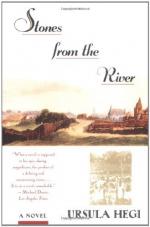|
This section contains 285 words (approx. 1 page at 300 words per page) |

|
A novel that may have set a precedent for Stones from the River is The Tin Drum by Gunter Grass. Grass, born in 1927 in Danzig, became the literary spokesman for the German generation that grew up in the Nazi era. When The Tin Drum was published in 1959 (as Die Blechtrommel), it created a furor in Germany. Like Stones, The Tin Drum brings to life average people living under Nazi rule as seen through the eyes of the "other," a dwarf named Oskar. Oskar registers his protest at the horrors of German/Polish society in Danzig during the reign of Nazism by refusing to grow after the age of three. By banging on his tin drum and shrieking with a voice so shrill that it can shatter glass, he registers his objections to the horrors and injustices of German occupation. The book has become a postwar classic...
|
This section contains 285 words (approx. 1 page at 300 words per page) |

|




